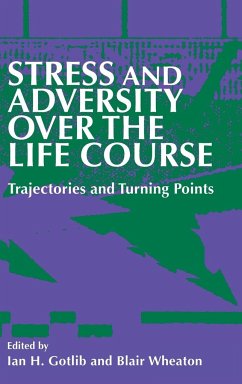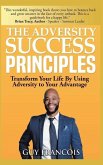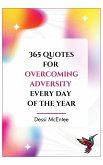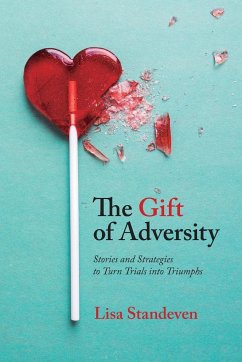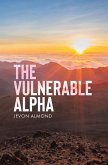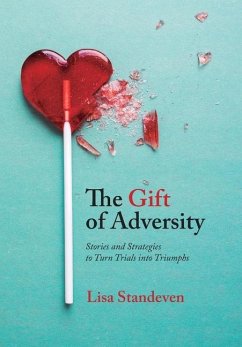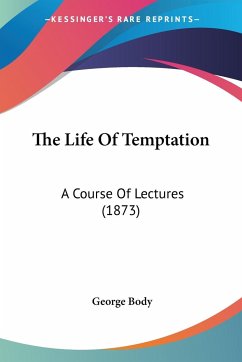Stress and Adversity over the Life Course
Herausgeber: Gotlib, Ian H.; Wheaton, Blair
Stress and Adversity over the Life Course
Herausgeber: Gotlib, Ian H.; Wheaton, Blair
- Gebundenes Buch
- Merkliste
- Auf die Merkliste
- Bewerten Bewerten
- Teilen
- Produkt teilen
- Produkterinnerung
- Produkterinnerung
This book examines the influence of early stressful experiences over the life course.
Andere Kunden interessierten sich auch für
![The Adversity Success Principles The Adversity Success Principles]() Guy FrancoisThe Adversity Success Principles18,99 €
Guy FrancoisThe Adversity Success Principles18,99 €![365 Quotes to Overcome Adversity Every Day of the Year 365 Quotes to Overcome Adversity Every Day of the Year]() Dessi McEntee365 Quotes to Overcome Adversity Every Day of the Year73,99 €
Dessi McEntee365 Quotes to Overcome Adversity Every Day of the Year73,99 €![The Gift of Adversity The Gift of Adversity]() Lisa StandevenThe Gift of Adversity24,99 €
Lisa StandevenThe Gift of Adversity24,99 €![The Vulnerable Alpha The Vulnerable Alpha]() Jevon AlmondThe Vulnerable Alpha22,99 €
Jevon AlmondThe Vulnerable Alpha22,99 €![Love Is In the Journey Love Is In the Journey]() Danielle AugustineLove Is In the Journey29,99 €
Danielle AugustineLove Is In the Journey29,99 €![The Gift of Adversity The Gift of Adversity]() Lisa StandevenThe Gift of Adversity25,99 €
Lisa StandevenThe Gift of Adversity25,99 €![The Life Of Temptation The Life Of Temptation]() George BodyThe Life Of Temptation34,99 €
George BodyThe Life Of Temptation34,99 €-
-
-
This book examines the influence of early stressful experiences over the life course.
Hinweis: Dieser Artikel kann nur an eine deutsche Lieferadresse ausgeliefert werden.
Hinweis: Dieser Artikel kann nur an eine deutsche Lieferadresse ausgeliefert werden.
Produktdetails
- Produktdetails
- Verlag: Cambridge University Press
- Seitenzahl: 312
- Erscheinungstermin: 29. Februar 2016
- Englisch
- Abmessung: 235mm x 157mm x 23mm
- Gewicht: 659g
- ISBN-13: 9780521550758
- ISBN-10: 0521550750
- Artikelnr.: 29337445
- Herstellerkennzeichnung
- Libri GmbH
- Europaallee 1
- 36244 Bad Hersfeld
- gpsr@libri.de
- Verlag: Cambridge University Press
- Seitenzahl: 312
- Erscheinungstermin: 29. Februar 2016
- Englisch
- Abmessung: 235mm x 157mm x 23mm
- Gewicht: 659g
- ISBN-13: 9780521550758
- ISBN-10: 0521550750
- Artikelnr.: 29337445
- Herstellerkennzeichnung
- Libri GmbH
- Europaallee 1
- 36244 Bad Hersfeld
- gpsr@libri.de
List of contributors; 1. Trajectories and turning points over the life
course: concepts and themes Blair Wheaton and Ian H. Gotlib; Part I.
Trajectories: Long-Term Effects of Adverse Experience: 2. Childhood
adversity and adult psychopathology Ronald C. Kessler, Jacquelyn
Gillis-Light, William J. Magee, Kenneth S. Kendler and Lindon J. Eaves; 3.
The impact of twenty childhood and adult traumatic stressors on the risk of
psychiatric disorder Blair Wheaton, Patricia Roszell and Kimberlee Hall; 4.
Intergenerational sanction sequences and trajectories of street-crime
amplification John Hagan and Bill McCarthy; 5. School-leavers' self-esteem
and unemployment: turning point or a station on a trajectory? David Dooley
and JoAnn Prause; 6. Intergenerational consequences of social stressors:
effects of occupational and family conditions on young mothers and their
children Elizabeth G. Menaghan; 7. Women's roles and resilience:
trajectories of advantage or turning points? Phyllis Moen; Part II. Turning
Points: Changes in Life Trajectories: 8. Becoming unsupervised: children's
transitions from adult-care to self-care in the afterschool hours Deborah
Belle, Sara Norell and Anthony Lewis; 9. Children whose parents divorce:
life trajectories and turning points Donald Wertlieb; 10. Life after high
school: development, stress and well-being Susan Gore, Robert Aseltine, Jr,
Mary Ellen Colten and Bin Lin; 11. Turning points in midlife Elaine
Wethington, Hope Cooper and Carolyn S. Holmes; 12. Adaptation to retirement
Robert S. Weiss; Part III. New Methods for the Study of the Life Course:
13. Construction and use of the life history calendar: reliability and
validity of recall data Nan Lin, Walter M. Ensel and Wan-foon Gina Lai; 14.
Using discrete-time survival analysis to study event occurrence across the
life course John B. Willett and Judith D. Singer; Index.
course: concepts and themes Blair Wheaton and Ian H. Gotlib; Part I.
Trajectories: Long-Term Effects of Adverse Experience: 2. Childhood
adversity and adult psychopathology Ronald C. Kessler, Jacquelyn
Gillis-Light, William J. Magee, Kenneth S. Kendler and Lindon J. Eaves; 3.
The impact of twenty childhood and adult traumatic stressors on the risk of
psychiatric disorder Blair Wheaton, Patricia Roszell and Kimberlee Hall; 4.
Intergenerational sanction sequences and trajectories of street-crime
amplification John Hagan and Bill McCarthy; 5. School-leavers' self-esteem
and unemployment: turning point or a station on a trajectory? David Dooley
and JoAnn Prause; 6. Intergenerational consequences of social stressors:
effects of occupational and family conditions on young mothers and their
children Elizabeth G. Menaghan; 7. Women's roles and resilience:
trajectories of advantage or turning points? Phyllis Moen; Part II. Turning
Points: Changes in Life Trajectories: 8. Becoming unsupervised: children's
transitions from adult-care to self-care in the afterschool hours Deborah
Belle, Sara Norell and Anthony Lewis; 9. Children whose parents divorce:
life trajectories and turning points Donald Wertlieb; 10. Life after high
school: development, stress and well-being Susan Gore, Robert Aseltine, Jr,
Mary Ellen Colten and Bin Lin; 11. Turning points in midlife Elaine
Wethington, Hope Cooper and Carolyn S. Holmes; 12. Adaptation to retirement
Robert S. Weiss; Part III. New Methods for the Study of the Life Course:
13. Construction and use of the life history calendar: reliability and
validity of recall data Nan Lin, Walter M. Ensel and Wan-foon Gina Lai; 14.
Using discrete-time survival analysis to study event occurrence across the
life course John B. Willett and Judith D. Singer; Index.
List of contributors; 1. Trajectories and turning points over the life
course: concepts and themes Blair Wheaton and Ian H. Gotlib; Part I.
Trajectories: Long-Term Effects of Adverse Experience: 2. Childhood
adversity and adult psychopathology Ronald C. Kessler, Jacquelyn
Gillis-Light, William J. Magee, Kenneth S. Kendler and Lindon J. Eaves; 3.
The impact of twenty childhood and adult traumatic stressors on the risk of
psychiatric disorder Blair Wheaton, Patricia Roszell and Kimberlee Hall; 4.
Intergenerational sanction sequences and trajectories of street-crime
amplification John Hagan and Bill McCarthy; 5. School-leavers' self-esteem
and unemployment: turning point or a station on a trajectory? David Dooley
and JoAnn Prause; 6. Intergenerational consequences of social stressors:
effects of occupational and family conditions on young mothers and their
children Elizabeth G. Menaghan; 7. Women's roles and resilience:
trajectories of advantage or turning points? Phyllis Moen; Part II. Turning
Points: Changes in Life Trajectories: 8. Becoming unsupervised: children's
transitions from adult-care to self-care in the afterschool hours Deborah
Belle, Sara Norell and Anthony Lewis; 9. Children whose parents divorce:
life trajectories and turning points Donald Wertlieb; 10. Life after high
school: development, stress and well-being Susan Gore, Robert Aseltine, Jr,
Mary Ellen Colten and Bin Lin; 11. Turning points in midlife Elaine
Wethington, Hope Cooper and Carolyn S. Holmes; 12. Adaptation to retirement
Robert S. Weiss; Part III. New Methods for the Study of the Life Course:
13. Construction and use of the life history calendar: reliability and
validity of recall data Nan Lin, Walter M. Ensel and Wan-foon Gina Lai; 14.
Using discrete-time survival analysis to study event occurrence across the
life course John B. Willett and Judith D. Singer; Index.
course: concepts and themes Blair Wheaton and Ian H. Gotlib; Part I.
Trajectories: Long-Term Effects of Adverse Experience: 2. Childhood
adversity and adult psychopathology Ronald C. Kessler, Jacquelyn
Gillis-Light, William J. Magee, Kenneth S. Kendler and Lindon J. Eaves; 3.
The impact of twenty childhood and adult traumatic stressors on the risk of
psychiatric disorder Blair Wheaton, Patricia Roszell and Kimberlee Hall; 4.
Intergenerational sanction sequences and trajectories of street-crime
amplification John Hagan and Bill McCarthy; 5. School-leavers' self-esteem
and unemployment: turning point or a station on a trajectory? David Dooley
and JoAnn Prause; 6. Intergenerational consequences of social stressors:
effects of occupational and family conditions on young mothers and their
children Elizabeth G. Menaghan; 7. Women's roles and resilience:
trajectories of advantage or turning points? Phyllis Moen; Part II. Turning
Points: Changes in Life Trajectories: 8. Becoming unsupervised: children's
transitions from adult-care to self-care in the afterschool hours Deborah
Belle, Sara Norell and Anthony Lewis; 9. Children whose parents divorce:
life trajectories and turning points Donald Wertlieb; 10. Life after high
school: development, stress and well-being Susan Gore, Robert Aseltine, Jr,
Mary Ellen Colten and Bin Lin; 11. Turning points in midlife Elaine
Wethington, Hope Cooper and Carolyn S. Holmes; 12. Adaptation to retirement
Robert S. Weiss; Part III. New Methods for the Study of the Life Course:
13. Construction and use of the life history calendar: reliability and
validity of recall data Nan Lin, Walter M. Ensel and Wan-foon Gina Lai; 14.
Using discrete-time survival analysis to study event occurrence across the
life course John B. Willett and Judith D. Singer; Index.

